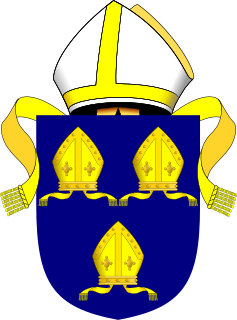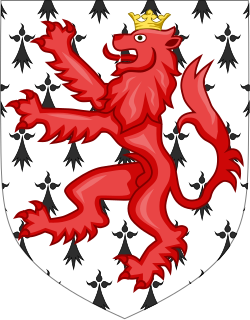Related Research Articles

Richard Bancroft was an English churchman, Archbishop of Canterbury from 1604 to 1610 and "chief overseer" of the King James Bible.

Charles James Blomfield was a British divine and classicist, and a Church of England bishop for 32 years.
Thomas Thirlby, was the first and only bishop of Westminster (1540–50), and afterwards successively bishop of Norwich (1550–54) and bishop of Ely (1554–59). While he acquiesced in the Henrician schism, with its rejection in principle of the Roman papacy, he remained otherwise loyal to the doctrine of the Roman Catholic Church during the English Reformation.

The Bishop of Norwich is the ordinary of the Church of England Diocese of Norwich in the Province of Canterbury. The diocese covers most of the county of Norfolk and part of Suffolk. The bishop of Norwich is Graham Usher.
Samuel Knight (1675–1746) was an English clergyman and antiquary.

William Lort Mansel was an English churchman and Cambridge fellow. He was Master of Trinity College, Cambridge from 1798 to his death in 1820, and also Bishop of Bristol from 1808 to 1820.

The Bishop of Ely is the ordinary of the Church of England Diocese of Ely in the Province of Canterbury. The diocese roughly covers the county of Cambridgeshire, together with a section of north-west Norfolk and has its episcopal see in the City of Ely, Isle of Ely in Cambridgeshire, where the seat is located at the Cathedral Church of the Holy Trinity. The current bishop is Stephen Conway, who signs +Stephen Elien:. The diocesan bishops resided at the Bishop's Palace, Ely until 1941; they now reside in Bishop's House, the former cathedral deanery. Conway became Bishop of Ely in 2010, translated from the Diocese of Salisbury where he was Bishop suffragan of Ramsbury.
Richard Howland (1540–1600) was an English churchman and academic, Master of Magdalene College, Cambridge, and of St John's College, Cambridge, and bishop of Peterborough.

James Turberville was an English cleric who served as Bishop of Exeter from 1555 to 1559.
Philip Baker, D.D., was provost of King's College, Cambridge.
Edward Leeds, was an English clergyman.

Robert Masters (1713–1798) was an English clergyman and academic, known as the historian of Corpus Christi College, Cambridge.
Michael Dunning (d.1558) was Chancellor of the Diocese of Norwich from 1554 under Mary Tudor, and with John Hopton, Bishop of Norwich, was responsible for the burning of 31 heretics. John Foxe characterised Dunning as the "bloody chancellor."

Sir William Ashburnham, 4th Baronet was a Church of England priest and also a baronet.

John Davies (1679–1732) was an English cleric and academic, known as a classical scholar, and President of Queens' College, Cambridge from 1717.
John Pory (1502/03–1570) was an English churchman and academic, Master of Corpus Christi College, Cambridge.
Humphrey Tyndall was an English churchman who became the President of Queens' College, Cambridge, Archdeacon of Stafford, Chancellor of Lichfield Cathedral and Dean of Ely.
Thomas Peacock was an English cleric and college head.

John Whalley was an English academic at the University of Cambridge, clergyman, and poet.
William Fleshmonger(? -1541/42), the son of a Winchester College tenant, was born in Hambledon, Hampshire. He was a Doctor of Canon Law and Dean of Chichester during the turmoil of the English Reformation.
References
- ↑ "Fuller, John (FLR558J)". A Cambridge Alumni Database. University of Cambridge.
- ↑ Foxe, John (1838). Seymour, Michael Hobart (ed.). The Acts and Monuments of the Church; containing the history and sufferings of the martyrs. London: Scott, Webster and Geary. pp. 820–821.
- ↑ Blakeman, Pamela (1990). The Book of Ely (Limited no. 589 ed.). Barracuda Books. p. 131. ISBN 0-86023-466-5.
- ↑ "Fuller, John (d. 1558/9)". Oxford Dictionary of National Biography (online ed.). Oxford University Press. doi:10.1093/ref:odnb/10231.(Subscription or UK public library membership required.)
- ↑ Roach, J P C, ed. (1959), "The Colleges and Halls: Jesus", The Victoria History of the Counties of England: A history of Cambridge and the Isle of Ely, vol. III, London: for The University of London Institute of Historical Research by the Oxford University Press, pp. 421–428
- ↑ Fuller, John (1885–1900). . Dictionary of National Biography . London: Smith, Elder & Co.
